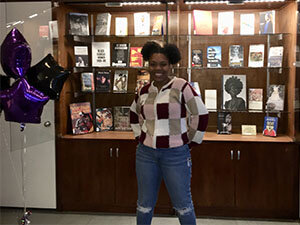History, Present, and Future
During Fall term 2018, Crossett Library set up a display of suggestion cards, inviting students to suggest ways to make the library more inclusive.
“Bring back the Black Library,” wrote Deja’ Haley ’20.

History
Haley came across Black Library during her first year at Bennington as part of her research for Karthik Pandian and Michael Wimberly’s 2017 Black Spring course, which culminated in a Usdan Gallery showcase about the Bennington experiences of Black students past and present.
While searching the archives, Haley found that in 1971, Bennington College’s library received a grant from the Scherman Foundation to purchase materials by Black authors. Black students served on the committee that shaped the resulting collection, which was called the Black Library. To distinguish these works within the wider collection, their catalogue cards were stamped “Black Library,” and the books featured a special book plate.
However, the project fell off over the years until recently, when Dean of the Library Oceana Wilson struck up a conversation with Haley about her note.
“I wanted to keep some sort of Black Library around, and I thought of doing it as an online database,” said Haley.
Haley started the project before Thanksgiving break and continued her research over Field Work Term, consulting with Wilson and Director of Library Services Jared Della Rocca to launch Crossett Library’s Black Studies Guide.
This digital resource arranges by topic the library’s catalogue of books and media by and about Black writers, artists, activists, historians, dancers, playwrights, musicians, and more. It also includes a unique section on Being Black at Bennington, which celebrates the work of Black alumni and offers historical records, course lists, and select student theses.
“I hope this guide helps other Black students speak up for what they want to see at Bennington, and I hope it helps them find the right person or office to build it,” said Haley. “I also want this online database to be an ongoing project that continues after I graduate.”
The Black Studies Guide is a publicly available resource for all community members, but for Black students, it also serves as a touchpoint that extends across generations.
“Being Black at Bennington involves building a foundation with each other,” said Haley. “We don’t have to be best friends, but we need to know we’re here for each other.”
Haley’s own decision to attend Bennington was influenced by the network of Black students and alumni she met while visiting campus.
“I stayed in the Davis Alumni House, and it happened that Janice Pryor ’71 was visiting that weekend,” said Haley. “Ash Haywood ’18 and Fiona McGovern ’18 interviewed her, and I was able to sit in.”
After the interview, Pryor stayed in the living room of the house to talk with Haley.
“She told me about her journey here, including the ups and downs,” said Haley. “I heard how passionate she was about coming from Bennington and the incredible work she’s done since. I thought, ‘I’m willing to put myself through the work and sacrifices in order to become something great.’”
During her college search, Haley applied to 12 schools before considering Bennington on her counselor’s recommendation.
“I’m from Philadelphia, and I had been set on going to Champlain College because Burlington gave me a city feel,” said Haley. “But I came to visit Bennington the weekend of decision day, and once I got on campus, I was in awe. I stayed the entire weekend, and on the train ride home, I emailed admissions and committed.”
Present
Now, Haley studies Psychology, Literature, and Black Studies, all of which contribute to a Plan focused on identifying mental illness within the Black community and methods to dismantle the stigma attached to it.
“There are cultural aspects that disallow Black people from wanting to go to therapy or seek help for mental issues, but my idea also comes from my personal life,” said Haley. “In my household, when I felt depressed or suicidal, I was told I needed to do something about it. This put the weight on me, but it’s also typical in Black culture to say, ‘Oh, there’s nothing wrong, you just need to go to church or pray more.’”
While spending a Field Work Term home in Philadelphia working at Dripping Knowledge Childcare Center, Haley also discovered a passion for working with children.
“I realized not only do I want to focus on mental illness in the Black community, but I want to focus on children because they are the future and will have the biggest impact,” said Haley. “I observed how the kids interacted with each other and how that behavior comes from their homes. I fell in love with these kids.”
After she graduates, Haley is considering graduate school at Boston University or Howard University, which offers a dual program to earn both a masters in Social Work and Divinity.
“I was raised Christian, but at Bennington, I started to rely on my own religious practices,” said Haley. Inspired by Dr. Jaiya John’s Daughter Drink This Water, she has come to believe in personally and individually defining the divine. “Now, I see God in what I do and how I carry myself.”
Future
As Haley continues to help build a more inclusive Bennington community, she also invites students to participate in a new Sharing is Understanding series she is helming. The series will feature honest and educational discussions on privilege, language barriers, microaggressions, and the effects of social media.
Haley also encourages the campus community to take ownership of the Black Studies Guide. Recommendations for featured works, notable alumni, or other ideas may be emailed to library@bennington.edu.
For those interested in the Black Spring exhibition, Wimberly’s Spring 2019 course Black Music Division — A Retrospective will continue the work of the 2017 project and culminate in a collective memory installation exploring the resonance of Black music past and present.
By Natalie Redmond, Associate Writer